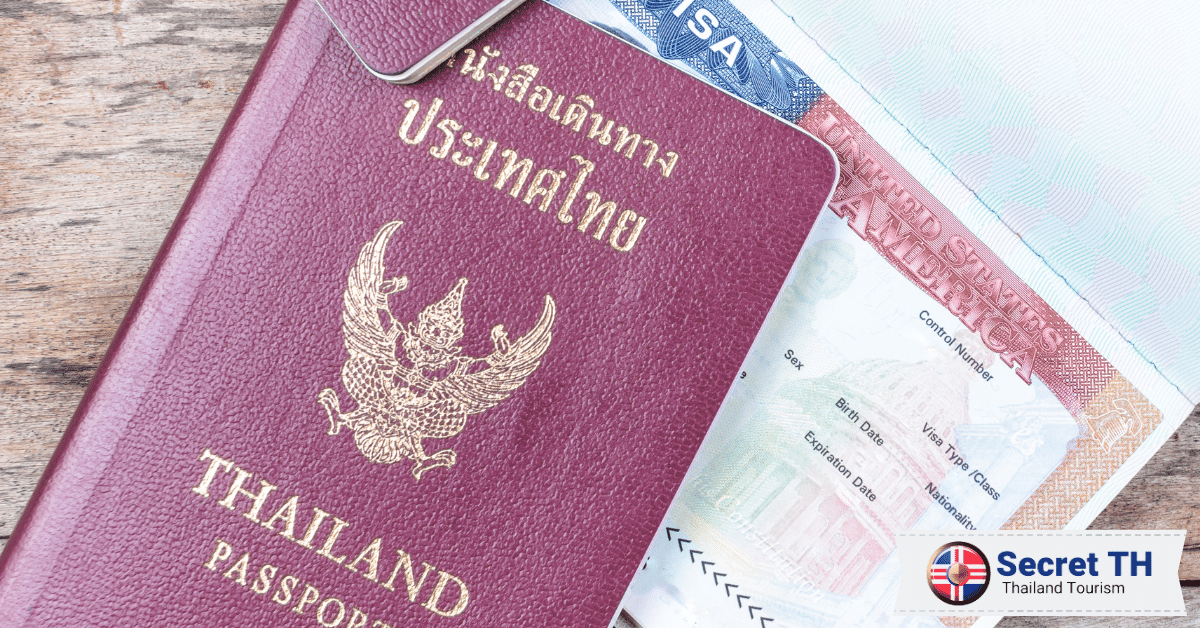Thailand visas can be a complex topic for travelers, but understanding the basics is crucial. There are several visa options available, including tourist visas, business visas, and retirement visas, each with its own requirements and limitations. It’s important to research and plans ahead to ensure a smooth and enjoyable visit to the beautiful country of Thailand.
In this blog, we will explore the various types of visas available, their requirements, and the benefits they offer to travelers.

Passport Validity / Visas
Before planning a trip to Thailand, you must verify the validity of your passport. International travel necessitates a passport that will not expire within six months of the departure date. If your passport has less than six months remaining, you cannot enter Thailand.
If you intend to travel in the future, examine your passport in advance to determine whether you need to register for a new one. Consult your local embassy to determine how long it will take to receive your new passport. As individuals begin to travel again, passport departments are inundated with new applications, causing backlogs in a number of nations.
There are a variety of visa options for foreigners intending to visit Thailand. The visa you require will depend on your country of origin, reason for travel, and intended length of stay.

Visas for Thailand
Whether you travel by air or by land, the entry procedures for visitors to Thailand are very simple. Thailand shares land borders with Malaysia, Myanmar, Cambodia, and Laos, and many travelers to Southeast Asia will enter and exit the country multiple times.
The majority of visitors to Thailand arrive on tourist visas (or are eligible for visa-free entry), but there are also non-immigrant visas for business travelers and students. For all visa types, you must have a passport that is valid for at least six months beyond your intended date of entry and has several open pages remaining.
Arrival requires a passport and completed Arrival and Departure cards regardless of visa status. Protect your passport and departure card. You may be denied entry without a ticket to your next destination and adequate money for your stay, although this is seldom checked. Arrival documents must indicate a Thai address. Check a guidebook or online if you haven’t booked a hotel.
Immigration and visa policies are administered by the Ministry of Foreign Affairs; consult the website or contact the Thai embassy or consulate closest to you for the most recent rules. Do I require a tourist visa? The nationality-specific section of Thailand’s e-visa website is incredibly useful for identifying visa requirements.

Types of Thailand Visas
When you enter Thailand, you’ll need one of many different sorts of visas in Thailand, depending on the reason for your trip. The following categories of visas are the most typical:

1. Tourist Visa
The tourist visa is specifically designed for travelers who intend to visit Thailand for tourism purposes. It grants visitors the opportunity to explore the country’s vibrant culture, breathtaking landscapes, and renowned attractions. With a tourist visa, you can immerse yourself in the rich history of Bangkok, relax on the stunning beaches of Phuket, or experience the cultural wonders of Chiang Mai.
The tourist visa for Thailand is initially valid for a period of 60 days, allowing you ample time to discover the beauty and charm of the country. During this period, you are free to indulge in a variety of activities, such as sightseeing, trying local cuisine, engaging in adventure sports, or simply lounging on picturesque shores.
2. Non-Immigrant Visa
Thai non-immigrant visas are for tourists who want to remain for a long time for reasons other than permanent residence. This visa is for business, education, employment, retirement, and visiting relatives in Thailand. Non-immigrant visa subclasses serve distinct objectives.
This includes the non-immigrant business visa for business activities, the education visa for students, the retirement visa for those 50 or older looking to retire in Thailand, the employment visa for Thai workers, and the family visit visa for visiting Thai relatives. Each subcategory has its own application, qualifications, and activities. Non-immigrant visa holders may remain in Thailand for a long time and pursue their personal goals.

3. Transit Visa
The transit visa is a type of visa designed for travelers who are passing through Thailand on their way to another destination. It allows individuals to briefly stay in Thailand while in transit, typically at an airport or seaport.
The transit visa is particularly useful for those who have connecting flights or require a short stopover in Thailand before continuing their journey. It provides the flexibility to explore the country during the transit period, engage in activities, or simply rest and refresh before the next leg of the trip.
4. Visa on Arrival
The visa on arrival is a convenient option available to travelers from certain countries who are visiting Thailand for tourism purposes. It allows eligible individuals to obtain a visa upon arrival at designated ports of entry, such as international airports or land border checkpoints.
The visa on arrival is typically granted for a duration of 15 days, giving travelers ample time to explore Thailand’s attractions and immerse themselves in its unique culture. During this period, visitors can indulge in various activities, including sightseeing, enjoying local cuisine, and experiencing the vibrant traditions of the country.

5. Elite Visa
This visa is a special visa program for those who wish to stay in Thailand for an extended period of time, usually for retirement or business purposes. The Elite Visa allows the holder to stay in Thailand for up to 20 years and offers a range of privileges and benefits.
Thai visas vary by purpose. Tourist, business, retiree, student, and medical visas are the most popular. Each visa has various demands and restrictions. Knowing your visa alternatives can help you prepare and enter Thailand smoothly. Stay tuned as we explore each visa category to assist you manage Thailand visas.

How to Apply for a Thailand Visa
If you are planning to visit Thailand, you may need to apply for a visa depending on your nationality and the length of your stay. Here are the steps to apply for a Thailand visa:
- Check visa requirements: Visit the official website of the Royal Thai Embassy or Consulate in your country to check the visa requirements. You can also find the necessary information on the website of the Ministry of Foreign Affairs of Thailand.
- Prepare the required documents: You will need to prepare several documents such as a passport, visa application form, photograph, flight itinerary, hotel booking, bank statement, etc. Make sure you have all the required documents before you apply.
- Apply for the visa: You can apply for the visa online through the official website of the Ministry of Foreign Affairs of Thailand or in person at the Royal Thai Embassy or Consulate in your country.
- Pay the visa fee: The visa fee varies depending on the type of visa you are applying for. Make sure you pay the fee using a valid payment method.
- Wait for processing: The processing time for a Thailand visa varies depending on the type of visa and the embassy or consulate where you applied. Generally, it takes 2-7 working days for the visa to be processed.
- Receive your visa: If your visa application is approved, you will receive your visa either by post or pick it up in person from the embassy or consulate.
It’s important to note that visa rules and regulations are subject to change, so it’s always best to check the official websites for the latest information before applying for a Thailand visa.

Conclusion
Visiting Thailand can be an enjoyable and memorable experience. All travelers should take the time to understand visa requirements and ensure they are meeting all necessary criteria before traveling. This blog has provided a brief overview of the different types of visas available, their requirements, and the benefits offered to travelers. It’s important to research your options and plan ahead so that you have a smooth and hassle-free visit to Thailand. Have a great trip!











